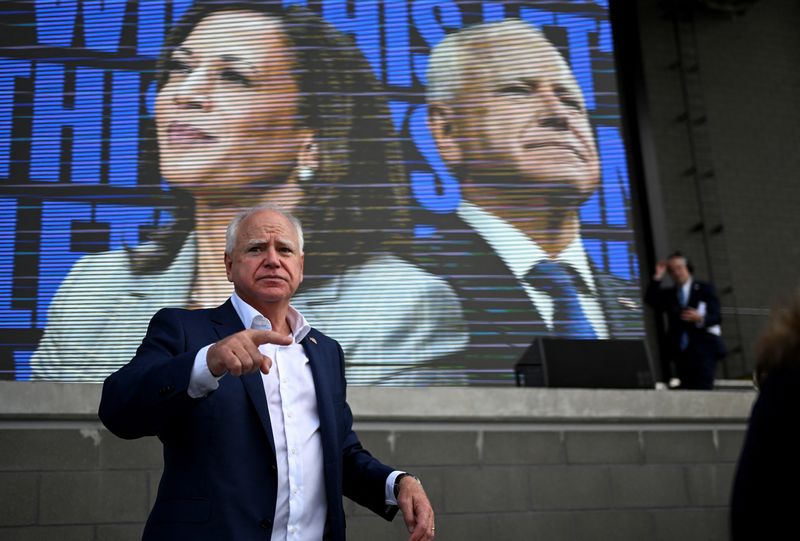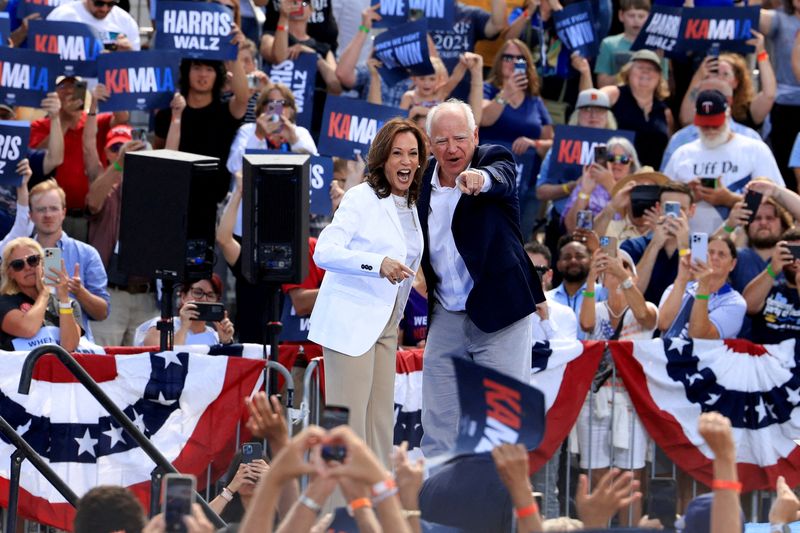By Stephanie Kelly and Jarrett Renshaw
BLACK RIVER FALLS, Wisconsin (Reuters) -David Mattison, a retired postal worker, had spent nearly all of his life in this remote corner of Wisconsin, watching family farms fail and small businesses go under with the hollowing out of the rural economy.
So he had approached this year's presidential election with a sense of detachment, not yet convinced either the Democratic or Republican candidates spoke to his concerns as a voter in rural America - until Minnesota Governor Tim Walz joined the Democratic ticket as Kamala Harris' running mate.
Mattison, who has voted for Republicans and Democrats, would have been open to a more conservative candidate. But he said he did not like Republican contender Donald Trump's divisiveness. And, while Mattison admitted he was unfamiliar with Walz's policies, he identified with the governor's background as a Midwesterner who was also raised in farm country.
"He's kind of a homegrown boy," Mattison, 68, told Reuters outside of a Walmart (NYSE:WMT) Supercenter in Black River Falls, Wisconsin, a city with a population of around 3,500 about 60 miles (97 km) from the Minnesota state border.
Harris campaign officials are betting Walz's folksy style, Midwestern roots and life story as a former farmer, teacher and National Guard member, will appeal to some of the white men in rural areas who voted for Trump by huge margins in the last two elections - and help deliver the battleground states of Wisconsin, Michigan and Pennsylvania for the Democrats.
But that is a tall order, especially in the Midwestern states where the electorate skews older, whiter and more blue collar: Trump's strongest demographic.
Reuters interviewed about 40 voters in northwest Wisconsin, one of the most closely fought areas of the state, about the candidates and their running mates, speaking to Democratic, Republican and undecided voters.
Many of those voters said they had made up their minds before Harris tapped Walz as her running mate.
But Mattison and one other independent voter said Harris' choice of Walz has pushed them toward the Democratic ticket this year. One former Trump voter had a favorable view of Walz but wasn't sure how he would vote. Another handful said they remained undecided.
Such incremental movements could be decisive in battleground states. Modest gains in a few segments of the electorate - such as white, working class voters - could make all the difference, said Chris Borick, a pollster and professor at Muhlenberg College in Pennsylvania.
President Joe Biden secured his 2020 election victory over Trump in part because he outperformed Hillary Clinton's 2016 performance among white, working class voters.
Biden still lost the segment overall, Borick said, "but he was able to nudge the dial up a few points and that made a big difference."
'DESTROYED MINNESOTA'
Still, it remains difficult for the Harris campaign to galvanize skeptical voters, even those who dislike Trump.
Kevin Dunning, 65, a Republican voter who previously owned a commercial painting company, told Reuters that he has never cast a vote for Trump and never would.
But he disliked Walz's actions as governor during the COVID-19 pandemic, when he ordered the temporary closures of dine-in restaurants, fitness centers and other businesses.
"Walz has destroyed Minnesota," Dunning said.
Instead, Dunning plans to write in his own name and that of his niece for president and vice president, while casting votes for candidates in other races.
The majority of states sway solidly Republican or Democrat, leaving the presidential race to be decided by a handful of battleground states that are legitimately up for grabs.
While Harris and Trump are largely tied in national opinion polls, they draw from very different demographics.
Harris significantly leads Trump among voters with college degrees, as well as Black and young voters, polls show.
Trump has an outsize advantage among white voters who didn't go to college, leading Harris 59% to 29% in July, according to an analysis of four Reuters/Ipsos polls.
That also gives him an edge in former industrial states Pennsylvania, Michigan and Wisconsin, which are older and whiter than the rest of the country.
While campaign officials expect Harris to drive up energy and turnout in diverse cities like Philadelphia and Detroit and reproduce Biden's huge margins in the suburbs, early polls show she faces more skepticism than Biden among white, working class voters.
On the Republican ticket, U.S. Senator JD (NASDAQ:JD) Vance from Ohio shares Trump's political beliefs, which mix isolationism and economic populism. Though Vance may help boost the Trump campaign in Pennsylvania and Michigan, his conservative views may be a turn-off for less extreme voters.
Walz learned how to sell the Democratic Party's liberal policies to skeptical white working-class voters when he was first elected to Congress in a conservative district in 2006.
In 2010, Walz was re-elected to Congress against a Republican landslide that sunk many other Democrats. Six years later he escaped with a win despite Trump's 15-point victory over Clinton.
Walz's performance against the backdrop of Republican landslides drew Harris advisers' attention when vetting vice presidential candidates, according to two sources familiar with the process.
Walz's district flipped to the Republican Party immediately after he left to run for governor in 2018.
Mary Brown, 69 and a job coach in Eau Claire, Wisconsin, was the second voter Reuters spoke with who swayed toward Harris after Walz joined the ticket.
'ALWAYS APPEARS TO BE NORMAL'
She said she would never vote for Trump and had been leaning toward voting Democratic in the presidential race. But she had been waiting to see Harris' choice as vice president; Brown liked that Walz, like her, was a former teacher.
In other races, Brown will vote based on the candidate instead of along party lines, she said.
Peter Norvold, a 68-year-old retiree with Democratic views, said he was "fan enough" of Harris, but appreciated Walz's steady demeanor.
Norvold's hometown of Hudson (NYSE:HUD), Wisconsin is separated from Minnesota by the St. Croix River, and he said he had seen Walz on television.
"He just always appears to be normal," Norvold said. "He just seems calm and secure, not worried. Doesn't seem to me to get angry, it doesn't look like."
Jason Nachreiner, 39 and a heating and air conditioning technician, has not been persuaded by either Harris or Trump. Harris is unproven, he said, while he thinks Trump might make the economy better but does not like the "turmoil" he brings.
He had voted for Trump in the last election, and for Clinton in 2016. He is going to vote this time around, but he has no idea how he will decide.

What could influence him?
"I don't even know," Nachreiner said, laughing. "An epiphany?"
